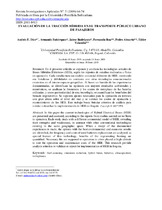| dc.contributor.author | Díez, Andrés E. | |
| dc.contributor.author | Bohórquez, Armando | |
| dc.contributor.author | Rodríguez, Jaime | |
| dc.contributor.author | Roa, Fernando | |
| dc.contributor.author | Almario, Pedro | |
| dc.contributor.author | Velandia, Edder | |
| dc.coverage.spatial | Seccional Medellín | spa |
| dc.date.accessioned | 2020-12-09T22:10:40Z | |
| dc.date.available | 2020-12-09T22:10:40Z | |
| dc.date.issued | 2009 | |
| dc.identifier.uri | http://hdl.handle.net/20.500.11912/7165 | |
| dc.description | 11 p. | spa |
| dc.description.abstract | En el presente artículo se exponen y analizan las tecnologías actuales de Buses Híbridos Eléctricos (HEB), según los reportes de estudios realizados a flotas en operación. Cada estudio trata un modelo comercial diferente de HEB, mostrando sus fortalezas y debilidades en contraste con otras tecnologías convencionales existentes en el mismo espacio geográfico. Al hacer un barrido de las experiencias documentadas, se identifican las opciones con mejores resultados ambientales y económicos, se analizan la frecuencia y los costos de reemplazo de las baterías utilizadas; y como particularidad de esta tecnología, se cuantifican los beneficios del frenado regenerativo. Se suponen ajustes necesarios para la operación en terrenos con gran altura sobre el nivel del mar y se valoran los costos de operación y mantenimiento de los HEB. Este trabajo busca brindar criterios de análisis para validar o desechar la implementación de HEB en Bogotá. | spa |
| dc.description.abstract | In this paper the current technologies of Hybrid Electrical Buses (HEB) are presented and assessed, according to the reports from studies carried out to fleets in operation. Each study deals with a different commercial model of HEB, revealing their strengths and weaknesses, in contrast with other conventional technologies existing in the same geographic space. When a swept of the documented experiences is made, the options with the best environmental and economic results are identified, the frequency and costs of used batteries replacement are analyzed, as special feature of this technology, benefits of the regenerating braking are quantified. Necessary fits are supposed to operation in cities placed at high altitude to rate the operation and maintenance costs of the HEB. This research provide analysis criterion to validate or reject the implementation of HEB in Bogota. | spa |
| dc.format.mimetype | application/pdf | |
| dc.language.iso | spa | |
| dc.publisher | UPB | spa |
| dc.relation.ispartof | Revista Investigaciones Aplicadas | spa |
| dc.rights | Attribution-NonCommercial-NoDerivatives 4.0 International | * |
| dc.rights.uri | http://creativecommons.org/licenses/by-nc-nd/4.0/ | * |
| dc.subject | Fuel economy | spa |
| dc.subject | emissions reduction | spa |
| dc.subject | hybrid buses | spa |
| dc.subject | batteries | spa |
| dc.subject | ultracapacitors | spa |
| dc.subject | trolleybuses | spa |
| dc.title | Evaluación de la tracción híbrida en el transporte público urbano de pasajeros | spa |
| dc.type | article | spa |
| dc.rights.accessRights | openAccess | spa |
| dc.type.hasVersion | publishedVersion | spa |
| dc.description.sectional | Medellín | spa |
| dc.identifier.instname | instname:Universidad Pontificia Bolivariana | spa |
| dc.identifier.reponame | reponame:Repositorio Institucional de la Universidad Pontificia Bolivariana | spa |
| dc.identifier.repourl | repourl:https://repository.unab.edu.co/ | |


